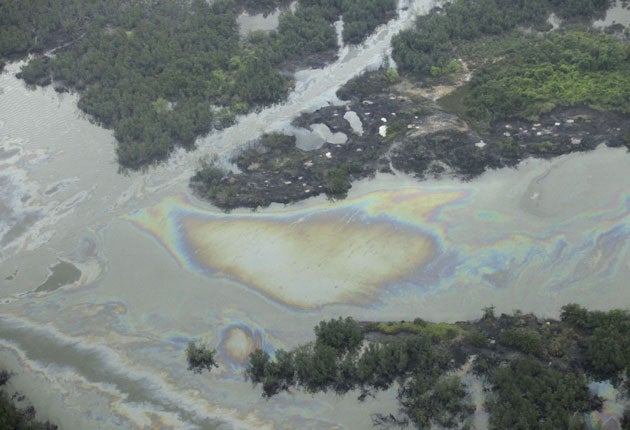UN: Widespread oil damage found in Nigeria delta

Your support helps us to tell the story
From reproductive rights to climate change to Big Tech, The Independent is on the ground when the story is developing. Whether it's investigating the financials of Elon Musk's pro-Trump PAC or producing our latest documentary, 'The A Word', which shines a light on the American women fighting for reproductive rights, we know how important it is to parse out the facts from the messaging.
At such a critical moment in US history, we need reporters on the ground. Your donation allows us to keep sending journalists to speak to both sides of the story.
The Independent is trusted by Americans across the entire political spectrum. And unlike many other quality news outlets, we choose not to lock Americans out of our reporting and analysis with paywalls. We believe quality journalism should be available to everyone, paid for by those who can afford it.
Your support makes all the difference.A region of Nigeria's oil-rich southern delta suffers widespread ecological damage as spilled oil seeps into its drinking water, destroys plants and remains in the ground for decades at a time, said a United Nations report released today.
The UN report focused on the Ogoniland area of Nigeria's Niger Delta, a region of swamps, mangroves and creeks almost the size of South Carolina or Portugal. Though production in the region stopped in 1993, pipelines and flowstations operated by a subsidiary of Royal Dutch Shellv and the state-run Nigerian National Petroleum Corporation still run through villages and fields.
Oil spills from those sites, caused by operator errors and vandalism, have thoroughly damaged lands, the UN found. In one case, the UN found a village where drinking water was polluted with benzene 900 times more than the international limit. The UN also found one area where an oil spill 40 years ago hadn't been cleaned.
"The Ogoni people live with this pollution every minute of every day, 365 days a year," the report said. "Since average life expectancy in Nigeria is less than 50 years, it is a fair assumption that most members of the current Ogoniland community have lived with chronic oil pollution throughout their lives."
The report also said that children born in Ogoniland are affected by the oil pollution daily, "as the odor of hydrocarbons pervades the air day in, day out."
Some environmentalists say as much as 550 million gallons of oil have poured into the Niger River Delta during 50 years of production — at a rate roughly comparable to one Exxon Valdez disaster per year.
Nigeria, an OPEC member, is one of the top crude oil suppliers to the US.
Shell funded the UN investigation, leading to criticism by some environmentalists that the report wouldn't take on the oil giant many demonise in the region. The report said damage can be caused by failing oil pipelines, as well as by thieves who tap into the lines to steal crude oil — a worsening problem in Ogoniland.
"It was not within (the UN's) scope to identify the cause of the individual spills, nor is it scientifically possible to detect the original cause of spills after an unknown time period," the report said.
The UN said it will take as much as 30 years to clean the lands of oil and suggested setting up an initial $1 billion trust fund for the cleanup. The world body suggested the oil industry and the government should put up those funds.
AP
Join our commenting forum
Join thought-provoking conversations, follow other Independent readers and see their replies
Comments